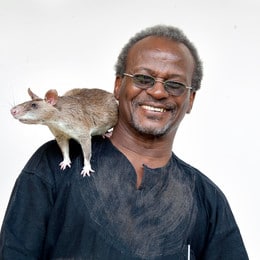Our African giant pouched rats, nicknamed HeroRATs, are helping to find landmines and detecting tuberculosis as part of an integrated approach. When deployed alongside standard methods, they speed up the process, getting people’s lives back on track as fast as possible.
LANDMINE
DETECTION
TUBERCULOSIS DETECTION
Why rats?
• Highly developed sense of smell
• Intelligent and easy to train
• Too light to set off the landmines
• Locally sourced and widely available
• Easily transferable between trainers
• Cheap to feed, breed and maintain
• Live 6-8 years
• Indigenous to sub-Saharan Africa and therefore resistant to most tropical diseases
Which species of rat?
APOPO’s HeroRATs are African giant pouched rats (cricetomys ansorgei). This large muroid rodent is found throughout most of sub-Saharan Africa. HeroRATs are omnivorous and mainly nocturnal. Their long heads have large ears and they get their name from the cheek pouches that are used to store and carry food. They have a long bare tail, which is white from middle to tip. The body is covered with buff-colored, relatively long fur with pale under parts. Their head and body lengths range from 25–30cm and tails ranging from 30–35 cm. These little heroes weigh between 1 and 1.3 kg (2.2 – 2.8lbs).
Sokoine University of Agriculture (SUA)
Early in APOPO’s history Bart Weetjens created a strong, productive partnership with the Sokoine University of Agriculture (SUA), in Morgoro, Tanzania, that has continued until today. After consulting with rodent experts and biologists at the University of Antwerp and SUA, the African giant pouched rat was chosen as the best-suited candidate. Under a collaboration agreement with SUA and the Tanzanian People Defense Forces, APOPO established its headquarters and training facilities on the SUA campus.

